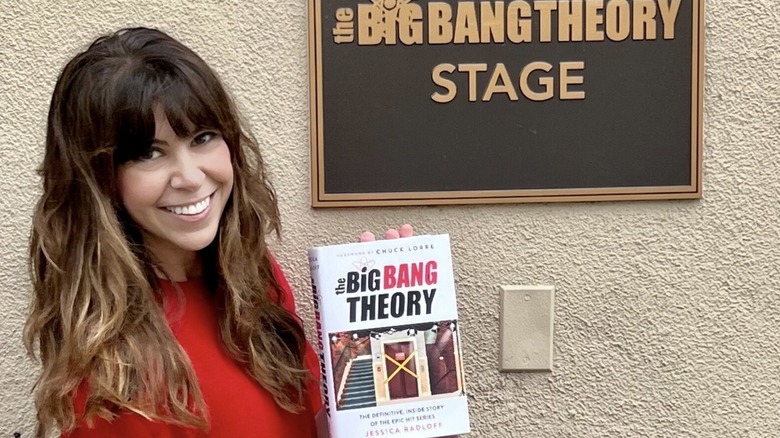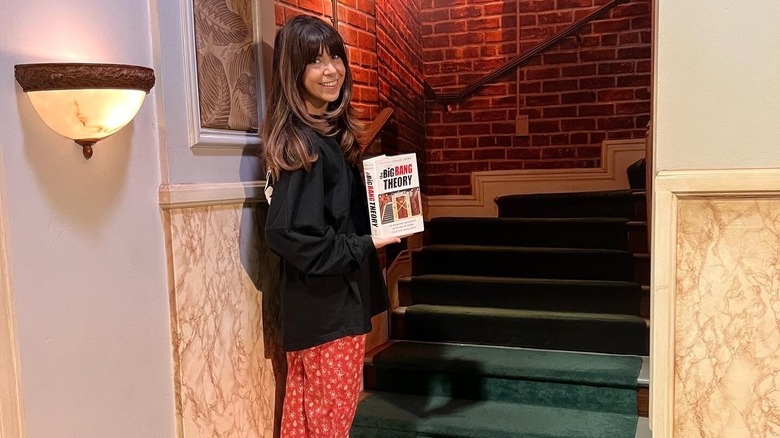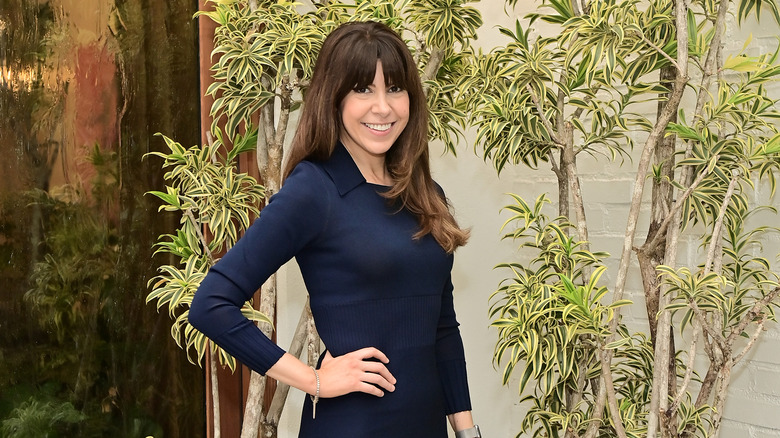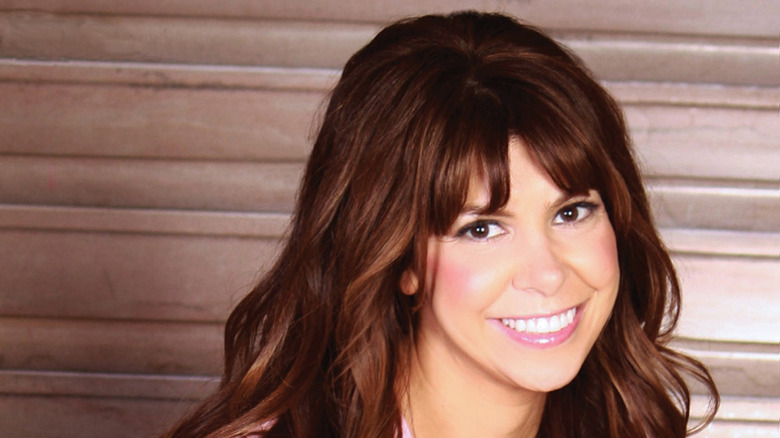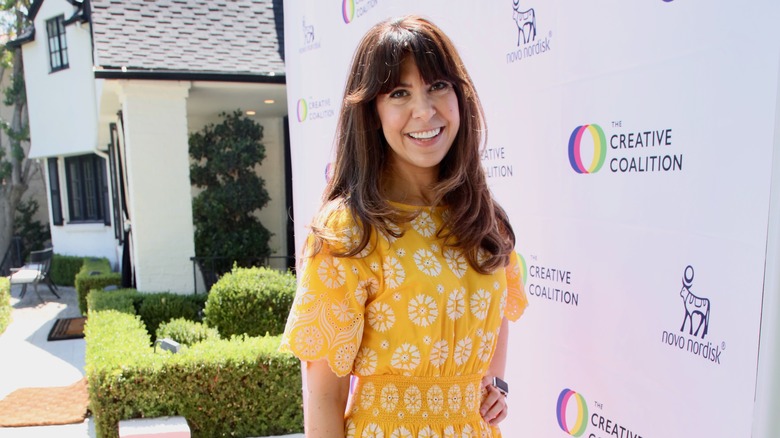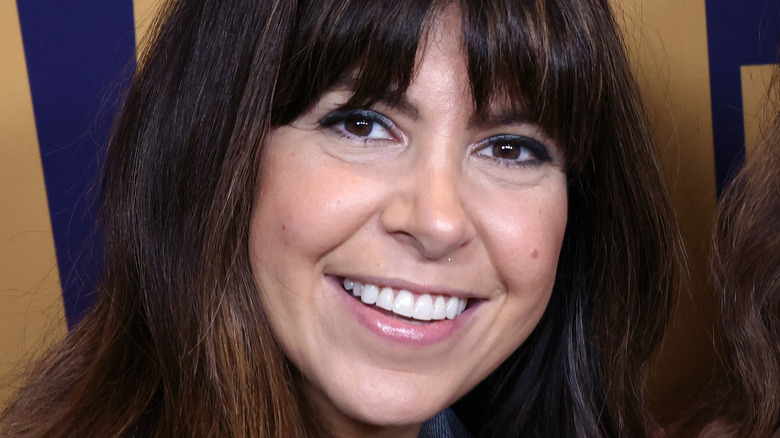Jessica Radloff On Her New Big Bang Theory Book Discussing The Success Behind The Show - Exclusive Interview
While sitcoms come and go from our television screens like the ever-changing weather in the peak of summer, some shows stand the test of time and even become more meaningful once off the air. Take "Friends," for instance, enjoying a renaissance on streaming services decades after the six pals initially hit the airwaves. "Schitt's Creek" — the Emmy-sweeping show that defined a significant era of Dan Levy's creativity — didn't pick up steam until the latter half of production, suddenly coming to an end to the dismay of loyal fans everywhere (though thanks to Hulu, we can watch David and Patrick fall in love time and time again). But one sitcom that has remained heartfelt, dedicated, and incredibly funny with time is "The Big Bang Theory," the show reveling in a 12-season long run over the course of 14 years.
"The Big Bang Theory," on its surface, tells the story of four socially awkward, nerdy scientists who earnestly try to navigate the halls of CalTech with the help of their much cooler (and incredibly pretty) neighbor, Penny. But as Jessica Radloff discovered while consuming the show — reporting on its complexity as a senior editor for Glamour and diving headfirst into her seminal book about the CBS hit — "The Big Bang Theory" encapsulates far more than four social outcasts doing their best to fit in.
Ahead of the release of "The Big Bang Theory: The Definitive, Inside Story of the Epic Hit Series," Radloff sat down with us for an exclusive interview and shared what complexities and nuances truly went into making "The Big Bang Theory" such a success.
Jessica wasn't initially a fan of The Big Bang Theory
Take me back to the work that you have done at Glamour as a senior editor. What was it like walking that parallel path between being an editor and "The Big Bang Theory"? What initially grabbed your attention as someone who works in the journalism industry?
I wish I could say I started watching "The Big Bang Theory” regularly from 2007 on, but that would not be the truth — so I'll be very honest about it. I remember watching the series in 2007, the first few episodes when it came on, and this was before I started at Glamour. I remember thinking that the pilot was a funny show, but I didn't keep up with it. I dropped off after the first few episodes. A lot of that was because at the time, you have different interests and different things, and there was only one female character, and I wasn't super interested in what the guys were doing originally.
When I joined Glamour in 2011, I started interviewing the cast at the different award shows because they were nominated around that time. It was Season 4 — so the SAG Awards, Golden Globes, Emmys. I got to know them as people first outside of the show ... Later that holiday season, I was home in St. Louis with a bad stomach flu. I remember laying on the couch, and my mom said, "Your father and I have started watching the funniest show on TV." "Guys, what is? I'm ready to die on the couch." They're like, "The Big Bang Theory." I'm like, "Fine. Put it on. I don't care. I'll watch whatever." They put it on, and my mom explained these character quirks and traits and who they were.
By the time I got over that stomach flu, I was a full-on "Big Bang Theory" fan. I could not wait the next time I saw the cast to start telling them, "Guys, I actually have started watching the show now, and I love it so much." I went back and started watching it, and at that point, we realized that our readership at Glamour was interested in the show because they had brought on Melissa [Rauch] and Mayim [Bialik], which changed the dynamic and opened up so many different stories. We realized, "There's an interest here. This is not a show that is just for guys or just for people obsessed with comic books or science. This is universal." That's where we started to realize, "We might be onto something here in our coverage."
I was watching it every week and writing about it — not just recaps, but actual think pieces where you dig into what was happening with the characters and why it was important. That's where it started. It really began, though, knowing these actors and these producers as people first, instead of the stories, which in some way helped me because I was more interested in them than the show. Then I got it, and I was like, "Okay. I see what this is about."
It's such a character-driven show. I don't think it's the type of show you can hop into the middle of and be like, "I get it." A lot of people do that and [are] like, "I don't understand." You need to see where these characters came from, and that's the intersection of why it worked so well between the Glamour readership and what we saw on screen. It was about who these people are, why we were seeing them on TV that was different from so many other characters we've seen, and why they were resonating.
What was it like for Jessica to appear in the series finale?
You had a cameo in the finale. I would love to hear more about that and what that experience and on-set dynamic was like.
I had a cameo in the finale playing a journalist. That's a stretch, but I will tell you something that I haven't talked about before, which was really funny. They told me what kind of clothes to bring, so I did. I brought my clothes, and I met with the wardrobe people at "Big Bang," and they're like, "This is too chic for what we're looking for. We need to re-dress you in the costume closet because we need you to look less professional." It was a little too fashion-forward. They were like, "Can you come and get her [a different outfit]?" I'm like, "Wow. The one journalist playing herself is told that she needs to get a different look."
I go backstage and I see Mayim [Bialik], and Mayim's like, "What are you doing here?" I was like, "I've got a cameo." She thought it was so funny. That was a lot of fun. That day, I was in a scene — it was the first part of the series finale where Amy and Sheldon have just won the Nobel. They come outside the apartment building, and there's all these journalists out there wanting to talk to them and get the first quotes from them about winning, and Sheldon freaks out and runs away. It was so cool to be able to do that.
Obviously, I knew Mayim. Mayim was my cantor at High Holy Days services at UCLA back ... I want to say in 2001. My best friend and I were there, and we didn't go home to St. Louis that year. I was like, "Oh my God. Blossom is our cantor. What is this? What happens in Hollywood?" They get all the Jewish actors to be rabbis and cantors ...
It was so much fun to be there that day and get to be with [the cast] on set. We didn't shoot the scene on the actual set. It was on the Warner Bros. lot outside what is Sheldon and Leonard's apartment building. It was so cool to see that and to be with them. We did quite a few takes — It's a lot of work. People don't understand how much work it is to do these sitcoms. The big thing is that it moves fast, but it's doing the same thing over and over again. It was really cool to have that cameo.
Jessica watched 'all 279 episodes' before embarking on her book journey
The book comes out soon — congratulations. I don't want to spoil or reveal too much about it, but as it got its footing and you flushed out the details, what's the main takeaway that you were working toward? What do you want readers to remember? This is quite an extensive collection of stories.
During the process of writing it and putting it together, I jokingly wrote to my editor at one point, "Any chance we could do volumes one, two, and three? The first book is Seasons 1 through 4, and then the next Seasons 5 through 8, and then 9 through 12?" Because I did not expect everybody to talk as much as they did. I knew they would all participate, but never in a million years [would] I have expected Jim Parsons would do over 20 hours of interviews with me, which was some of the most fun interviews I've ever had in my life.
I bet. You must consider them friends and collaborators at this point.
They really are. I cannot thank them enough for how much they went there with me. That was one of the things I was actually nervous about going into the book because I do know them so well and I am friends with them, and I didn't want people to think I was going to let them off the hook because I was friends with some of them.
I knew some a little better than others, but I needed them to trust me and to know, "If you're going to tell these stories, we're going to do it right and we're going to do it here." They went there, and I am so eternally grateful for that. The "Friends" cast — I doubt they would've done a book like this. That is with all due respect to the "Friends" cast, who are lovely people. But can you imagine them doing a huge book like this three years after the show ended and sitting down for hours of interviews? It took many years to do a reunion special.
The fact that they sat down to do this was amazing. With that said, the goal when I started this was to show why this show resonated so much and was so popular. One of the things that drove me the craziest through my years of covering the show is people who would say to me, "I don't understand that show. It's overrated. It's cheesy." I would get so frustrated because I'm like, "You clearly haven't watched it."
We all have differences, but I rewatched all 279 episodes before I started on the interview process, including the original unaired pilot, which has never been released before. I took notes on every episode, and by the time I was done again and even throughout, I realized, "This is such a brilliant show." I already knew [that], but I have an even deeper respect now for what the actors did and what the writers did than I ever had before.
The feminist lens of the show lent to Jessica's work as a journalist
Jessica Radloff (continued): The goal [of the book] was twofold — one, to pay homage to what this show did and why it resonated. You don't have 24 million people tuning in to watch a mediocre show every week. This was a great show. Why did it resonate? Why was it so personal?
A lot of that is how we'd seen characters on this show that we had never seen before. We were talking about things that we hadn't also seen in a lot of storylines, [like] Amy bleaching the hair on her upper lip before a date with Sheldon. As a Jew, that is something I've had to do my entire life — bleach the hair on my arms and on my upper lip. To see that on television and to see these characters try to fit in and to struggle and to sometimes exist was something that was relatable.
The other reason was I tried to bring the Glamour angle into it, which, for us at Glamour, we always want to find the female angle, the female point of view. It did register so much, and the show succeeded and ran as long as it did because ... I feel like it got better once they introduced Melissa [Rauch] and Mayim [Bialik] because they were able to open up all these different stories. They pulled it in such a heartfelt, honest way.
The whole narrative of the book set out to show, how did this show change perceptions? How did it grow? Why did it become so popular? What were the conversations like behind the scenes that helped it get there? When the show started, there wasn't a female in the writer's room. What made it get to this place where it was so beloved? They were telling me stories that resonated not just with men, but with women. That was the goal.
The female element of it is so interesting because I'm trying to think of another show that brought such multifaceted female lead characters. We always have the best friend and the sidekick and those stereotypical tropes, but to see women in prominent positions in the STEM environment, to see someone like Penny not necessarily abandon her acting ambitions, but to grow and change and challenge herself, not as in someone in their early 20s ... A lot of women can identify with those struggles and challenges.
Oh, yeah. It's funny because Kaley [Cuoco] in the book talks about how she loved that they had Penny not wanting to have kids. She loved that, because she said in some ways, it was mirroring her own life. People expect you to get married and want to have kids, and she said, "That's not everybody's path." Never mind the fact that Penny did get pregnant in the finale — which they do talk about and do a deep dive into whether that was the right decision or not. But she loved that Penny was career-focused.
With Bernadette, we loved the fact that she wasn't sure about motherhood. She didn't know if she was going to have a maternal instinct. She was also afraid [that if] she took maternity leave, is she going to lose an important project at work? They did all these important topics but made it funny — so that registered, and you also had how it affected the guys.
I wanted to highlight that and why this show resonated with so many people. I hope that people will have a greater respect for the show and these actors — especially when they hear what they went through in order to make this show so successful — than they ever have before. That's my goal with it.
The personal struggles were worth the book's success
In what ways did you grow both professionally and personally through this experience of balancing Glamour, the book, and extensive interviews?
This is by far the hardest thing I've ever had to do, the juggling between both jobs. It nearly wrecked me. I admit in the acknowledgments that I'm now on a cholesterol-lowering medication. I had to get computer glasses because I strained my eyes so much looking at a screen 18 hours a day. I lost a lot of hair because of stress. It changed me so much, but it also made me realize what I was capable of.
Chuck Lorre gave me probably the biggest compliment during this whole process. For one, Chuck did 10 hours of Zooms, and people joked with me like, "I've never talked to Chuck for more than 10 [minutes]. You talked to him for 10 hours?" I was like, "Yes. I did." It taught me one thing — a lot of people are very intimidated by this man.
It taught me not to be so intimidated by anybody. If you treat them all with respect and kindness and understand where they're coming from, that's how I've always approached everything. I want to understand people and let them have a platform to talk and tell their stories. Chuck was very impressed with the research that I did, which meant a lot to me. He expects a level of excellence and I expect a level of excellence, and that matched. He said to me at one point, "You could be the next Barbara Walters after this." I was like, "I'm sorry. What?"
His compliments were so meaningful because Chuck is not a person that dishes out compliments unless he truly believes it. This project made me realize what I was capable of doing. As somebody that has always struggled with self-confidence at times and thinking, "Am I capable of doing this? Am I good enough to do it?" ... This gave me that confidence that yes, you can do it. You might lose hair, you might be on a cholesterol-lowering medication, you might need some glasses after this, but you can do it.
Really, Chuck and the cast are some of the kindest, most thoughtful people that I have ever met. It's such a sense of pride and joy for me to get to tell their story in the detail that they never have been able to do before.
Jessica Radloff's "The Big Bang Theory: The Definitive, Inside Story of the Epic Hit Series" is available to purchase starting on October 11.
This interview has been edited for clarity.
